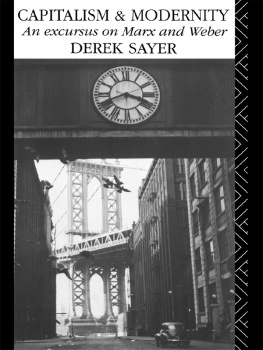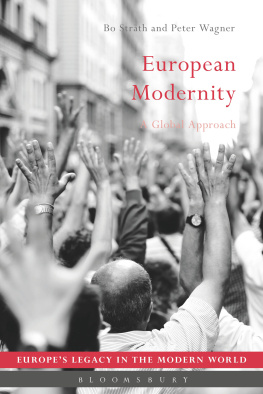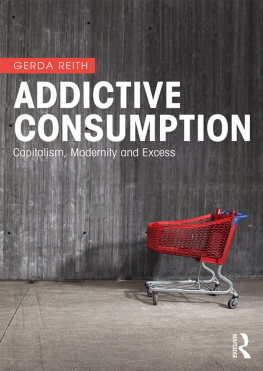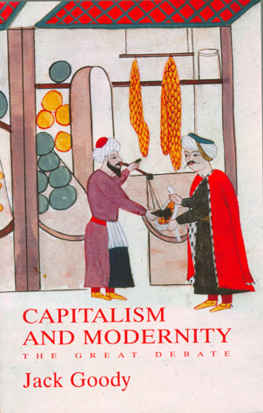DEREK SAYER - Capitalism and Modernity
Here you can read online DEREK SAYER - Capitalism and Modernity full text of the book (entire story) in english for free. Download pdf and epub, get meaning, cover and reviews about this ebook. year: 2011, publisher: Routledge, genre: Religion. Description of the work, (preface) as well as reviews are available. Best literature library LitArk.com created for fans of good reading and offers a wide selection of genres:
Romance novel
Science fiction
Adventure
Detective
Science
History
Home and family
Prose
Art
Politics
Computer
Non-fiction
Religion
Business
Children
Humor
Choose a favorite category and find really read worthwhile books. Enjoy immersion in the world of imagination, feel the emotions of the characters or learn something new for yourself, make an fascinating discovery.
- Book:Capitalism and Modernity
- Author:
- Publisher:Routledge
- Genre:
- Year:2011
- Rating:4 / 5
- Favourites:Add to favourites
- Your mark:
- 80
- 1
- 2
- 3
- 4
- 5
Capitalism and Modernity: summary, description and annotation
We offer to read an annotation, description, summary or preface (depends on what the author of the book "Capitalism and Modernity" wrote himself). If you haven't found the necessary information about the book — write in the comments, we will try to find it.
DEREK SAYER: author's other books
Who wrote Capitalism and Modernity? Find out the surname, the name of the author of the book and a list of all author's works by series.
Capitalism and Modernity — read online for free the complete book (whole text) full work
Below is the text of the book, divided by pages. System saving the place of the last page read, allows you to conveniently read the book "Capitalism and Modernity" online for free, without having to search again every time where you left off. Put a bookmark, and you can go to the page where you finished reading at any time.
Font size:
Interval:
Bookmark:

The nature of modernity, and its connection with capitalism, are questions at the forefront of contemporary sociological debate.
Derek Sayer re-examines the answers given by Karl Marx and Max Weber, authors of two of the most profound sociological critiques of modernity. His reassessment of Marx and Weber on capitalism and modernity provides a new reading which reveals the remarkable consonances between their sociologies of the modern condition. Going beyond the well-known stereotypes of the Marx-Weber debate, Professor Sayer shows that both Marx and Weber produced a challenging critique of the nature of power and subjectivity in modern society, a critique which retains all its intellectual force and moral relevance today.
A major work of original scholarship, Capitalism and Modernity is clearly and accessibly written. It is an authoritative and provocative commentary on a debate central to modern sociology and politics, and will be a key text in social theory for students of sociology, politics and philosophy.

First published in 1991
by Routledge
11 New Fetter Lane, London EC4P 4EE
Simultaneously published in the USA and Canada
by Routledge
29 West 35th Street, New York, NY 10001
Routledge is an imprint of the Taylor & Francis Group
This edition published in the Taylor & Francis e-Library, 2005.
To purchase your own copy of this or any of Taylor & Francis or Routledges collection of thousands of eBooks please go to http://www.ebookstore.tandf.co.uk/.
1991 Derek Sayer
All rights reserved. No part of this book may be reprinted or reproduced or utilized in any form or by any electronic, mechanical, or other means, now known or hereafter invented, including photocopying and recording, or in any information storage or retrieval system, without permission in writing from the publishers.
British Library Cataloguing in Publication Data
A catalogue record for this book is available from the British Library
Library of Congress Cataloguing in Publication Data
Sayer, Derek.
Capitalism and modernity: an excursus on Marx and Weber/Derek Sayer.
p. cm.
Includes bibliographical references.
1. Civilization, Modern. 2. Capitalism. 3. Marx, Karl, 18181883Views on capitalism. 4. Weber, Max, 18641920Views on capitalism. I. Title.
HM101.S28145 1990
306.3 42dc20 908337
ISBN 0-203-40320-7 Master e-book ISBN
ISBN 0-203-71144-0 (Adobe e-Reader Format)
ISBN 0-415-01728-9 (Print Edition)
To Suzy, Lesley, Audrey, Jenny and Natalieand Virginia
To begin with what might appear to be a digression in a work of social theory, in a way which may or may not be apparent, events of 1989 in two central squares of capital cities frame what I try to say here. As I was close to finishing this book there came the tender revolution (as the Czechs call it) whose most visible manifestation was the people congregating nightly in their hundreds of thousands in Wenceslas Square in Prague, to reclaim those who had long been officially erased from the national life and memory the playwright Vclav Havel, the gymnast V#x011B;ra #x010C;#x00E1;slavsk, the popsinger Marta Kubiov, and perhaps most poignantly of all, the minor forestry official Alexander Dubek. This was not the sort of revolution to which the modern world is used. It was, for once, a revolution against those ersatz gods of modernity who have stolen, by divine right of ideology, decades of peoples lives, hopes and dreams; a refusal of the reduction of the personal to the political.
Informing this unusual revolution was (in Vclav Havels own words) a profound distrust of all generalizations, ideological platitudes, clichs, slogans [and] intellectual stereotypes, a distrust bred by forty years of experience. Havel (1989) drew a simple conclusion:
The stifling pall of hollow words that has smothered us for so long has cultivated in us such a deep mistrust of the world of deceptive words that we are now better equipped than ever before to see the human world as it really is: a complex com-munity of thousands of millions of unique, individual human beings, in whom hundreds of beautiful characteristics are matched by hundreds of faults and negative tendencies. They must never be lumped together into homogeneous masses beneath a welter of hollow clichs and sterile words and then en blocas classes, nations or political forcesextolled or denounced, loved or hated, maligned or glorified.
Such totalizing representations have been identified, in recent social theory, as critical components of power. They are by no means confined to socialism. In this book I argue that they are characteristic of modern sociality, and constitute its greatest threat to human life, what I have elsewhere called the violence of abstraction (1987). This violence is rooted in, but now goes far beyond, the capitalism which was modernitys progenitor. Its locus is the forms society and subjectivity take in the modern world. From this point of view we may be witnessing, in Eastern Europe, not the return of the prodigal to the fold of the West hailed by politicians from Thatcher to Bush, but something quite new: a post-modern revolution, if you will. I hope so. But to quote Havel again, if it is a long time since there were so many grounds for hoping that everything will turn out well, at the same time there have never been so many reasons for us to fear that, if everything went wrong, the catastrophe would be final. He rehearses a dismal litany, from atomic war and ecological disaster to social and civilizational catastropheby which I mean the widening gulf between rich and poor individuals and nations. Humanity remains poised on a knife-edge of survival.
Students played a major part in the tender revolution. But a few short months before, on the other side of the modern world, other students, equally courageous, had been less fortunate. As I was starting to write this book, they were brutally slaughtered in Tienanmen Square, Beijing, by a government which had commended itself to the West by its pursuit of what it called the four modernizations. These did not include the First Amendment. The events in the two squares were later to be brought together in a nice coincidence. We learned that President George Bush (having just vetoed a bill which would have permitted Chinese students in the USA to remain there after their visas had expired) had sent a high-level mission to Beijing to normalize US relations with the Peoples Republic of China, on the same day on which that dean of normalizers, President Gustav Husk, announced his intention to resign his tenancy of Prague Castle. Neither in the West nor in the East can we yet congratulate ourselves on living in a post-modern world. The modern deities still demand their human sacrifices. There remains, then, reason to ponder sociological critiques of modernity. I try to explicate what remain two of the most profound (despite Marxisms substantial contribution to the twentieth-century ideological pantheon) in what follows.
I would like here to express my deep gratitude to those friends and colleagues who improved my efforts by freely giving of that most precious of modern commodities, their time. Philip Corrigan, Shmuel Eisenstadt, Raymond Morrow, P.A.Saram, Teodor Shanin and Bryan Turner read the manuscript of this book, in some cases through several drafts. All provided me with very helpful comments and suggestions, which I have done my best to respond to. To Alena I owe a great deal more than the translation of
Font size:
Interval:
Bookmark:
Similar books «Capitalism and Modernity»
Look at similar books to Capitalism and Modernity. We have selected literature similar in name and meaning in the hope of providing readers with more options to find new, interesting, not yet read works.
Discussion, reviews of the book Capitalism and Modernity and just readers' own opinions. Leave your comments, write what you think about the work, its meaning or the main characters. Specify what exactly you liked and what you didn't like, and why you think so.













